朗文新派少儿英语 基础级 Unit-9 Celebrations
- 格式:ppt
- 大小:6.03 MB
- 文档页数:10
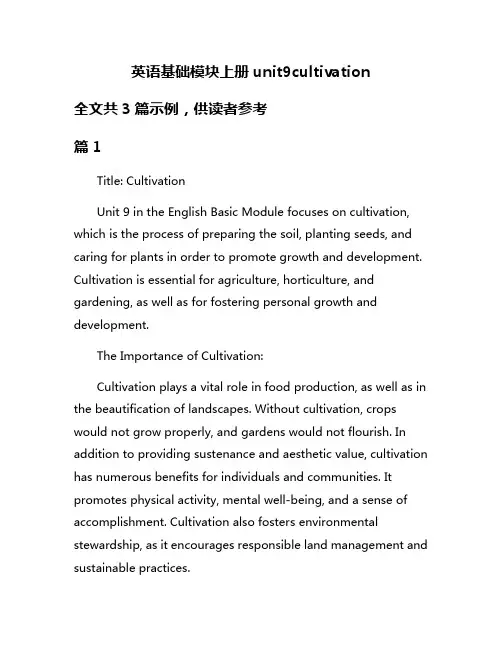
英语基础模块上册unit9cultivation全文共3篇示例,供读者参考篇1Title: CultivationUnit 9 in the English Basic Module focuses on cultivation, which is the process of preparing the soil, planting seeds, and caring for plants in order to promote growth and development. Cultivation is essential for agriculture, horticulture, and gardening, as well as for fostering personal growth and development.The Importance of Cultivation:Cultivation plays a vital role in food production, as well as in the beautification of landscapes. Without cultivation, crops would not grow properly, and gardens would not flourish. In addition to providing sustenance and aesthetic value, cultivation has numerous benefits for individuals and communities. It promotes physical activity, mental well-being, and a sense of accomplishment. Cultivation also fosters environmental stewardship, as it encourages responsible land management and sustainable practices.The Process of Cultivation:The process of cultivation involves several key steps, including preparing the soil, selecting seeds or plants, planting them, watering and feeding them, and protecting them from pests and diseases. Each step is important for ensuring the success of the cultivation process. Proper soil preparation, for example, helps plants establish strong roots, while regular watering and feeding supply them with essential nutrients. Pesticides and fungicides can be used to control pests and diseases that may threaten the health of plants.Cultivating Personal Growth:Cultivation is not only important for plants but also for individuals. Cultivating personal growth involves nurturing one's talents, skills, and potential in order to reach one's full potential. This process requires dedication, patience, and hard work, just like cultivating plants. By setting goals, developing new habits, and seeking out opportunities for growth, individuals can cultivate their personal development and achieve success in various areas of their lives.Cultivation in Education:Cultivation is also a key concept in education, where it refers to the process of nurturing students' intellect, skills, and character. Educators cultivate their students by providing them with the knowledge, resources, and support they need to succeed. By creating a positive learning environment, setting high expectations, and fostering a growth mindset, teachers can cultivate their students' academic and personal growth. Cultivation in education also involves promoting moral values, social skills, and emotional intelligence in students.In conclusion, cultivation is a fundamental process that plays a crucial role in agriculture, horticulture, gardening, and personal development. By understanding the importance of cultivation, mastering the process, and applying it to various aspects of life, individuals can grow and thrive in both their personal and professional endeavors. Cultivation is a journey of growth, transformation, and self-discovery that requires patience, dedication, and resilience. As we cultivate our gardens and ourselves, we become more connected to nature, to others, and to ourselves. Let us embrace the process of cultivation as a pathway to growth, fulfillment, and success.篇2Unit 9 CultivationIn Unit 9 of the English basic module, students will learn about cultivation, which is the process of preparing and tending to the soil in order to grow crops or plants. Cultivation is an essential part of agriculture and is crucial for providing food for the world's population. In this unit, students will learn about different cultivation techniques, tools, and practices.1. Types of Cultivation:- Traditional Cultivation: This method involves manually preparing the soil using tools such as hoes and shovels. Traditional cultivation is labor-intensive but is still widely practiced in many developing countries.- Mechanized Cultivation: This method uses machines such as tractors and plows to prepare the soil. Mechanized cultivation is more efficient and allows for larger areas of land to be cultivated in a shorter amount of time.- Organic Cultivation: This method involves growing crops without the use of synthetic chemicals or pesticides. Organic cultivation is becoming increasingly popular due to its environmental benefits and health benefits for consumers.2. Cultivation Tools:- Plow: A plow is a farming tool used to break up and turn over soil in preparation for planting. There are different types of plows, including the moldboard plow and the disc plow.- Hoe: A hoe is a gardening tool used to remove weeds and cultivate the soil. There are different types of hoes, including the Dutch hoe and the draw hoe.- Tractor: A tractor is a farming vehicle used to pull heavy machinery such as plows and seeders. Tractors are essential for mechanized cultivation.3. Cultivation Practices:- Crop Rotation: Crop rotation is the practice of planting different crops in the same field in succession. This helps to maintain soil fertility and prevent soil erosion.- Mulching: Mulching is the practice of covering the soil with materials such as straw or bark to retain moisture and suppress weeds. Mulching also helps to improve soil structure.- Irrigation: Irrigation is the process of supplying water to crops to ensure proper growth and yield. There are different irrigation methods, including drip irrigation and sprinkler irrigation.In conclusion, cultivation is a fundamental aspect of agriculture and plays a crucial role in feeding the world's population. By learning about different cultivation techniques, tools, and practices in Unit 9, students will gain a deeper understanding of how food is produced and the importance of sustainable farming practices.篇3Unit 9 Cultivation in the Basic English module focuses on various aspects of cultivation, including agriculture, gardening, and the development of skills and knowledge. In this unit, students will learn key vocabulary related to cultivation, practice their listening and speaking skills through discussions androle-plays, and engage in reading and writing activities to deepen their understanding of the topic.One of the key topics covered in this unit is agriculture. Agriculture is the practice of cultivating crops and raising animals for food, fiber, and other products. Students will learn about different types of agriculture, such as subsistence farming, commercial farming, and organic farming. They will also learn about the importance of sustainable agriculture practices in preserving the environment and ensuring food security for future generations.Another important topic covered in this unit is gardening. Gardening is the practice of cultivating plants, such as flowers, fruits, vegetables, and herbs, for aesthetic purposes or for consumption. Students will learn about the tools and techniques used in gardening, as well as the different types of gardens, such as flower gardens, vegetable gardens, and herb gardens. They will also learn about the benefits of gardening, such as physical exercise, stress relief, and connecting with nature.In addition to agriculture and gardening, students will also explore the development of skills and knowledge related to cultivation. This includes learning about the history of agriculture, the science of plant growth, and the role of technology in modern farming practices. Students will also learn about the importance of lifelong learning and continuous improvement in cultivating their skills and knowledge in this field.Overall, Unit 9 Cultivation in the Basic English module is designed to help students develop a deeper understanding of the practices, principles, and benefits of cultivation. By learning about agriculture, gardening, and the development of skills and knowledge in this field, students will be better equipped to engage with the world around them and make informed decisions about their own cultivation practices.。
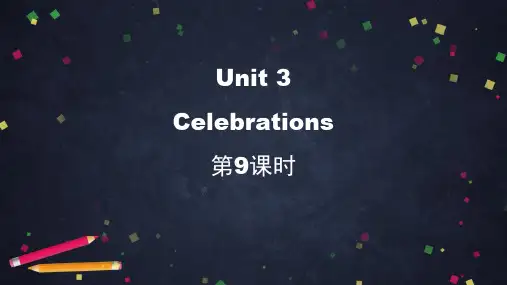
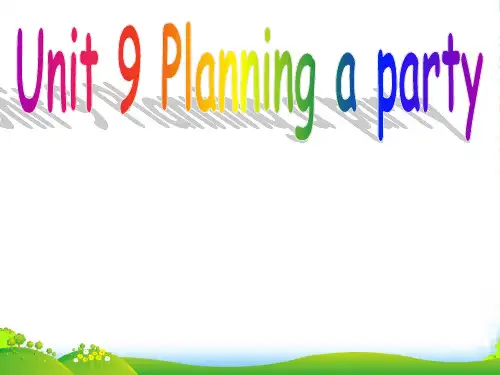

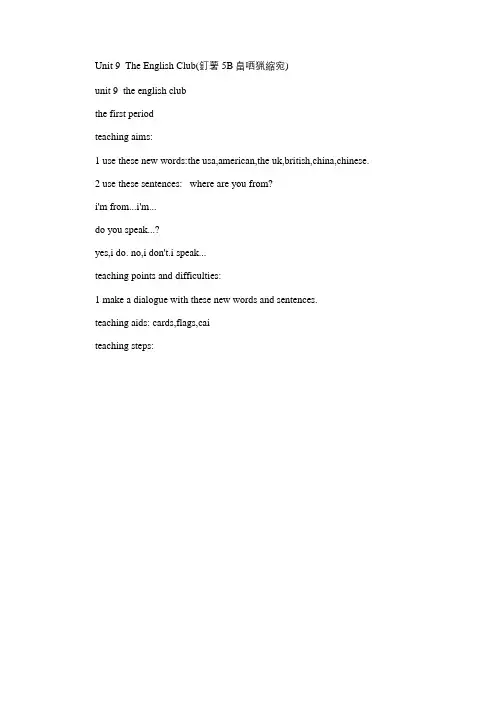
Unit 9 The English Club(釘薯5B畠哂猟縮宛)unit 9 the english clubthe first periodteaching aims:1 use these new words:the usa,american,the uk,british,china,chinese.2 use these sentences: where are you from?i'm from...i'm...do you speak...?yes,i do. no,i don't.i speak...teaching points and difficulties:1 make a dialogue with these new words and sentences.teaching aids: cards,flags,caiteaching steps:warming up:do some sports with the balls.step2presentation and pratice.1.to guide the new words(the usa,american)with mickey mouse,then practise them.2.to guide the new words(the uk,british)with top dance,then practise them.3.to guide the new words(china,chinese)with the song,then practise them.the new words consolidation: (read after me. read together. play a game.)step3to guide the new sentences with mickey mouse: -------where are you from? i'm from...i'm...(introduce yourselves with the sentences above. to guide another new sentences by teacher.)do you speak...? yes,i do. no,i don't.i speak...1.the dialogue leraning: read after me. read together. reading with a missing game.2.sing a song with the missing sentences.step5expansion:the beijing olympic games need some reporters.let students make dialogues. the second period teaching contents:5b unit 9 part b look, read and learn(countries & nationalities) part c ask and answer teaching aims and demands: 1 four skilled words and phrases: china chinese, the uk, british, the usa, american, japan, japanese,australia,australian france french。


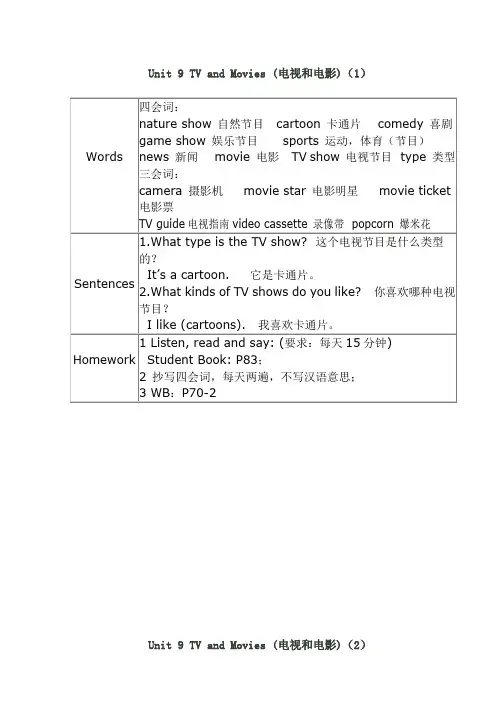

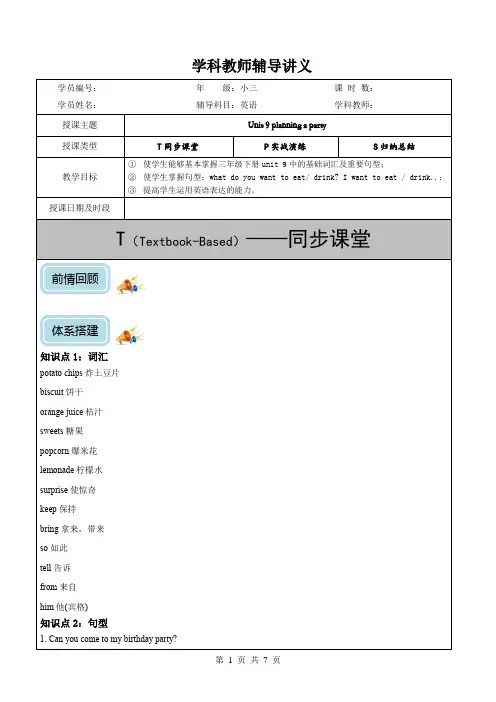
学科教师辅导讲义前情回顾体系搭建知识点1:词汇potato chips炸土豆片biscuit饼干orange juice桔汁sweets糖果popcorn爆米花lemonade柠檬水surprise使惊奇keep保持bring拿来,带来so如此tell告诉from来自him他(宾格)知识点2:句型1.Can you come to my birthday party?你能来我的生日聚会吗?2.When’s your party?你的聚会是什么时候?…It’s on…是在…(时候)on后面接某天或是星期,at后面接某时。
例如:When’s your birthday party?你的生日聚会在什么时候?It’s on Sunday at five thirty.在星期天五点半3.What do you want to eat?你想吃什么?I want to eat…我想吃…4.What do you want to drink?你想喝什么?I want to drink…我想喝…5.I like…我喜欢…典例分析例题1:连词成句1.is,it,Sunday,on2.time,is,what,it?3.want,eat,to,do,what,you?4.apple,juice,you,like,do?5.are,friends,my,doing,what,?6.Mary‘s,when,my,doing,what,?7.can,I,food,what,bring?8.can,I,food,what,bring,?专题精讲want的用法want的用法主要有三点:1.want sth.想要某物2.want to do sth.想要做某事3. want sb. to do sth.想要某人做某事1、want sth.中的sth.一般是名词,如apple, pencil, book, money等,我想要点水。
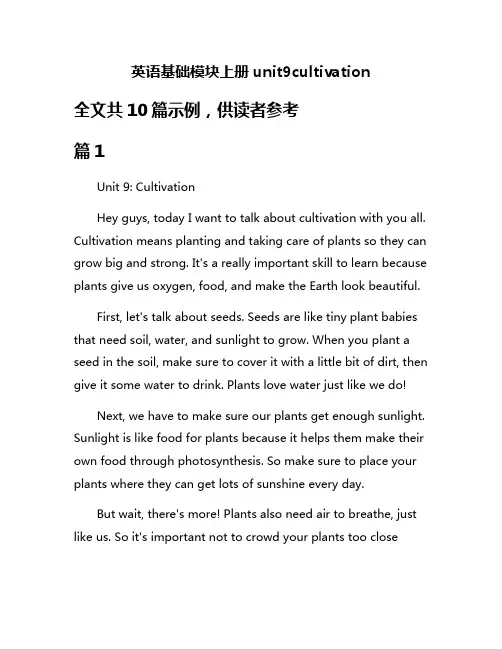
英语基础模块上册unit9cultivation全文共10篇示例,供读者参考篇1Unit 9: CultivationHey guys, today I want to talk about cultivation with you all. Cultivation means planting and taking care of plants so they can grow big and strong. It's a really important skill to learn because plants give us oxygen, food, and make the Earth look beautiful.First, let's talk about seeds. Seeds are like tiny plant babies that need soil, water, and sunlight to grow. When you plant a seed in the soil, make sure to cover it with a little bit of dirt, then give it some water to drink. Plants love water just like we do!Next, we have to make sure our plants get enough sunlight. Sunlight is like food for plants because it helps them make their own food through photosynthesis. So make sure to place your plants where they can get lots of sunshine every day.But wait, there's more! Plants also need air to breathe, just like us. So it's important not to crowd your plants too closetogether. Give them some space to grow and spread out their leaves.And don't forget to check on your plants regularly. Make sure they're not too dry or too wet, and look out for any bugs or diseases that might harm them. If you see anything wrong, don't be afraid to ask for help from a grown-up or a teacher.Remember, taking care of plants is a fun and rewarding activity. So grab your shovel and watering can, and let's get cultivating! Let's make the world a greener and happier place one plant at a time.That's all for today. Thanks for listening, friends! See you next time.篇2Unit 9 CultivationHi everyone! Today we are going to talk about cultivation, which means taking care of plants and helping them grow. Just like we need food, water, and sunlight to grow big and strong, plants also need these things to grow healthy and happy.First, let's talk about seeds. Seeds are like tiny little magic beans that contain all the information and nutrients needed togrow a plant. But they need some help to start growing. We can plant seeds in soil, water them, and give them sunlight to help them sprout. It's like giving them a cozy little bed to sleep in and some yummy food to eat.Next, let's talk about watering plants. Just like we need to drink water every day, plants also need water to stay hydrated and grow. Water helps transport nutrients from the soil to the plant and also helps the plant create food through a process called photosynthesis. So remember to water your plants regularly, but not too much or too little – just enough to keep them happy.Sunlight is also very important for plants. Just like we need sunlight to stay warm and get Vitamin D, plants need sunlight to make food and stay healthy. So make sure to place your plants in a sunny spot where they can get enough light to thrive.Lastly, let's talk about taking care of plants. Just like we need love and care to grow up happy and healthy, plants also need some TLC. This means checking on them regularly, removing any dead leaves or flowers, and giving them a little boost with some plant food from time to time.So there you have it, cultivation is all about helping plants grow by giving them the right materials and care. Remember tobe patient and enjoy the process of watching your plants grow and flourish. Happy gardening!篇3Hey everyone, today I want to talk about cultivation from our English basic module unit 9. Cultivation is a really cool word that means taking care of plants and helping them grow. Just like how our teacher takes care of us and helps us learn new things, plants need someone to take care of them too.So, when you're cultivating plants, there are a few things you need to remember. First, plants need sunlight to make food. Just like how we need food to grow big and strong, plants need sunlight to make their own food. So make sure your plants get enough sunlight every day.Next, plants need water to stay healthy and hydrated. Just like how we need water to drink, plants need water to keep their roots happy. So make sure to water your plants regularly, but don't give them too much water or they might get sick.Also, plants need good soil to grow in. Just like how we need a comfy bed to sleep in, plants need good soil to put down their roots. So make sure to give your plants good soil so they can grow big and strong.And finally, plants need love and care. Just like how we need hugs and kisses to feel happy, plants need love and care to thrive. So make sure to talk to your plants, sing to them, and give them lots of love.By taking care of plants and helping them grow, we can learn a lot about nature and how to take care of our planet. So let's all become plant caretakers and help our green friends grow big and strong. Remember, just like how plants need us, we need them too. Let's all work together to make our world a greener and happier place.篇4Unit 9 CultivationHey everyone! Today I'm going to talk about Unit 9 in our English basic module book. It's all about cultivation! Do you know what cultivation means? It's when you grow and take care of plants and crops. Isn't that cool?First, we learned about different types of cultivation. We talked about farming, gardening, and even hydroponics! Farming is when you grow crops like corn and wheat in fields. Gardening is when you have a small garden at home and grow flowers or vegetables. And hydroponics is a super cool way togrow plants without soil, just using water and nutrients. How cool is that?Next, we learned about the tools and equipment you need for cultivation. You need things like shovels, rakes, gloves, and watering cans. Oh, and don't forget about the most important tool of all – your green thumb! That's what we call it when someone is really good at growing plants.We also talked about the different stages of plant growth. It starts with planting the seeds, then the seeds sprout and grow into seedlings. After that, the seedlings grow into young plants, and finally, they become mature plants that are ready to be harvested.We even did a fun experiment where we planted our own seeds and watched them grow. It was so exciting to see the little plants pop up out of the soil. I can't wait to take care of my plant and watch it grow big and strong.So, that's all about Unit 9 – cultivation. I hope you learned a lot about growing plants and how important it is to take care of our environment. Let's all be good plant parents and help our little green friends thrive! Thanks for reading, see you next time!篇5Unit 9 CultivationHello everyone! Today I want to talk to you about Unit 9 in our English basic book, which is all about cultivation. Do you know what cultivation means? It means taking care of plants and helping them grow.First, let's talk about the different things that plants need to grow. Plants need water, sunlight, and nutrients from the soil. Just like us, plants need water to stay hydrated and sunlight to make food through the process of photosynthesis. They also need nutrients from the soil to help them grow big and strong.You can help plants grow by watering them regularly, making sure they get enough sunlight, and giving them fertilizer to provide the nutrients they need. It's like taking care of a pet, but instead of feeding it food, you're giving the plant everything it needs to thrive.Another important thing to remember when cultivating plants is to protect them from pests and diseases. Just like how we can get sick from germs, plants can also get sick from bugs or fungus. You can prevent this by keeping your garden clean, removing any dead or diseased plants, and using natural remedies like neem oil or soap spray to keep pests away.Cultivation is not just about taking care of plants, it's also about enjoying the process and watching them grow. It's amazing to see a tiny seed grow into a big, beautiful plant with flowers or fruits. It can be a lot of fun to have your own garden and watch your plants thrive under your care.So, let's all remember to take care of our plants and help them grow big and strong. Cultivation is a great way to connect with nature and learn about the world around us. Let's all be little gardeners and enjoy the magic of watching things grow!篇6Unit 9 Cultivation is such a fun and interesting topic to learn about in English class! In this unit, we will learn all about plants, gardening, and how to take care of them. Isn't that awesome?Plants are really cool because they can grow and change all by themselves. We just need to give them some water, sunlight, and love, and they will grow big and strong. some people even have gardens where they grow flowers, fruits, and vegetables. How cool is that?I remember one time when my parents planted some tomato seeds in our backyard. We made sure to water them every day and keep them in the sun. After a few weeks, we sawlittle green sprouts coming up from the ground. It was so exciting to see them grow and eventually turn into juicy red tomatoes that we could eat. Gardening is so much fun!In this unit, we will also learn about different tools and materials for gardening. We will learn the names of different plants and flowers, as well as how to take care of them. Did you know that different plants need different amounts of water and sunlight? It's so interesting to learn about how to keep them happy and healthy.I can't wait to dive into this unit and learn all about cultivation. I love being in nature and learning about how things grow. I hope you enjoy it too! Let's get ready to explore the wonderful world of plants and gardening together. Let's go!篇7Unit 9 CultivationHey guys! Today I want to talk about Unit 9 in the English Basic Module textbook, which is all about cultivation. Cultivation is a fancy word for growing and taking care of plants. It's super important because plants give us oxygen, food, and make the world a beautiful place.First, let's talk about the parts of a plant. There's the roots, stem, leaves, flowers, and fruits. Each part has a specific job to do to help the plant grow big and strong. The roots take in water and nutrients from the soil, the stem holds the plant up and carries water and nutrients to the rest of the plant, the leaves use sunlight to make food for the plant, the flowers attract bees and other insects to help make seeds, and the fruits carry the seeds so new plants can grow.Next, let's talk about how we can take care of plants. Plants need water, sunlight, and nutrients to grow. We can water plants regularly, make sure they get enough sunlight, and give them plant food to help them stay healthy. We also need to protect plants from pests and diseases that can harm them.Lastly, let's talk about why plants are so important. Plants produce oxygen for us to breathe, give us fruits and vegetables to eat, make our environment beautiful, and provide habitats for animals. So let's all do our part to help take care of plants and make sure they thrive.That's it for today, guys! I hope you learned a lot about cultivation from this article. Let's all do our part to help plants grow and make the world a better place. See you next time!篇8Unit 9 CultivationHi everyone! Today, I want to tell you all about cultivation. Do you know what cultivation means? Well, it's like taking care of plants and helping them grow big and strong. It's really important because plants give us food, oxygen, and make the world a more beautiful place.There are a few things we need to do to cultivate plants. First, we need to plant seeds in the soil. We have to make sure the seeds are covered with soil and water them regularly. Plants need water to grow, just like we need water to stay healthy.Next, we need to give the plants sunlight. Plants use sunlight to make their own food through a process called photosynthesis. That's why it's important to put plants in a sunny spot where they can get plenty of light.We also need to make sure the plants have enough space to grow. If plants are crowded together, they won't be able to get the nutrients and sunlight they need. So, we have to plant them a good distance apart.Lastly, we need to take care of the plants by giving them fertilizer and removing any weeds that might be competing for nutrients. Fertilizer provides plants with extra nutrients to help them grow strong, while weeds can steal those nutrients away.So, remember to take good care of your plants by watering them, giving them sunlight, providing enough space to grow, and tending to them regularly. With a little love and care, your plants will grow big and healthy!That's all for today. I hope you learned something new about cultivation. Bye for now!篇9Unit 9 CultivationHey guys! Today we are going to talk about cultivation in our English class. Cultivation means growing plants and taking care of them. It's super important because without plants, we wouldn't have food to eat or oxygen to breathe!There are many things we need to do to cultivate plants. First, we need seeds. Seeds are like magic because they have all the information to grow a new plant. We can plant seeds in the soil and add some water to help them grow.Next, we need sunlight. Sunlight is like food for plants. It gives them energy to make their own food through a process called photosynthesis. So make sure to put your plants in a sunny spot!We also need to water our plants regularly. Plants get thirsty too, just like us. Make sure not to overwater them though, because that can make them sick. It's important to find the right balance.Don't forget about soil! Good soil is important for plants to grow healthy and strong. You can add some compost or fertilizer to give them extra nutrients.Lastly, we need to protect our plants from pests and diseases. You can use natural remedies like neem oil or eggshells to keep them away.Cultivating plants can be a lot of fun and rewarding. You get to see them grow and change every day. So let's all be little gardeners and help our plants thrive!That's all for today's lesson. Remember to take care of our plants and the environment. Bye-bye!篇10Unit 9 CultivationHi everyone! Today, let's talk about Unit 9 from our English textbook, which is all about cultivation. Cultivation means growing and taking care of plants, like flowers, fruits, and vegetables. It's really cool because you get to watch them grow and change over time.One of the things we learn in this unit is how important it is to water plants. Just like how we need water to survive, plants also need water to grow big and strong. If we forget to water them, they can wilt and die. So remember, always water your plants regularly!Another important thing we learn about in this unit is sunlight. Plants need sunlight to make food through a process called photosynthesis. So make sure to place your plants in a sunny spot where they can get enough sunlight to grow well.We also learn about soil in this unit. Good soil is really important for plants to grow healthy. It should be rich in nutrients and have good drainage so that the roots can soak up all the nutrients they need.In Unit 9, we also learn about different tools we can use for cultivation, like shovels, rakes, and watering cans. These toolshelp us take care of our plants and make sure they have everything they need to grow.So there you have it, Unit 9 is all about cultivation and how we can take care of plants. It's really fun to learn about and it's a great way to appreciate nature and all the amazing things it can do. Have fun cultivating your plants and watching them grow!。